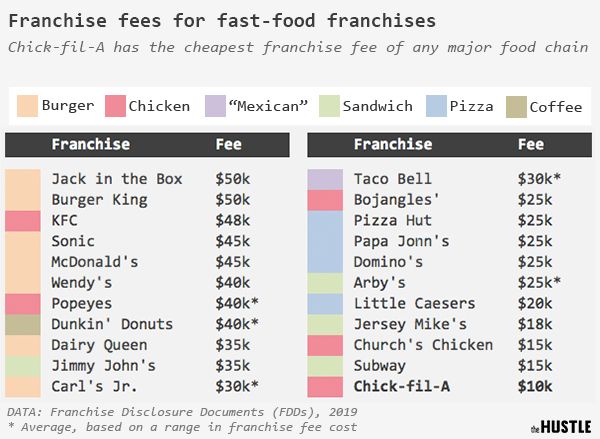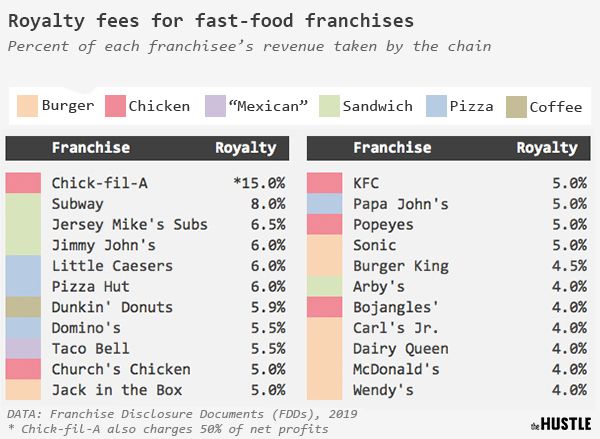We've all been there. We've walked into one of our favorite fast food joints only to find ourselves thinking, "Wow, the one by my house is so much better!" Although they serve the same food and share the same logo, the experience varies greatly. Welcome to the intriguing world of franchising, where diversity reigns. So why is this system so complex? Does the perfect formula to franchising exist? I'll simply say, there isn't one there are many and the key is knowing which formula is right for you.
Why brands have varying franchising models:
- Business Model and Concept: Each restaurant has a unique business model and a specific target market, menu offerings, and overall brand identity. This all influences how they structure their franchise agreement.
- Market and Regional Differences: The food industry is highly influenced by varying preferences. Therefore, some restaurants may adapt their franchise models to better suit specific regional markets and consumer expectations.
- Operational Complexity: Some franchises may require more specialized equipment, training, or operational support, leading to variations in their franchising approach.
- Size and Resources: Larger and more established restaurant chains may have the capacity to develop more comprehensive franchise systems, whereas smaller or newer brands may offer simpler arrangements due to limited resources.
- Risk Management, Brand Protection & Quality Control: Franchisors may choose different levels of involvement and control in their franchise operations to manage risks, maintain quality and protec the brand.
- Financial Factors: The financial terms of a franchise agreement, such as initial investment, royalties, and advertising fees, may vary based on the profitability and growth potential of the restaurant chain.
Why becoming a franchisee may be right for you:
I know what you're thinking, that was a lot and how in the world are you supposed to know all of this? Fortunately, for aspiring entrepreneurs who have some capital to invest in a new business but find themselves short of funds to purchase property, equipment, or invest in marketing, there is an alternative path: becoming a franchisee and leveraging an established brand with deep industry knowledge.
By partnering with a larger company that knows the industry, you can tap into their expertise and resources. Franchising offers several advantages, including instant brand recognition, risk mitigation, and group purchasing power.
While the idea may seem straightforward, the first crucial step is to conduct thorough research to determine which brand aligns best with your goals and values. Fast food chains offer diverse franchising models, and as you can imagine, some are flourishing while others, unfortunately, have faced challenges or even ceased operations. In the following week, we will delve into a few case studies, but for now, let's take a closer look at Chick-fil-A as a prime example.
The Chick-fil-A Way
Chick-fil-A stands out as a dominant player in the fast-food industry, consistently outperforming other major brands in terms of average revenue. According to the QSR 50 report, Chick-fil-A restaurants generate an impressive $5 million in annual revenue, surpassing McDonald's at $2.9 million, Burger King at $1.4 million, and Subway franchises at $375,000 (all figures are gross revenue). In fact, the highest-earning Chick-fil-A non-satellite location brought in an incredible $17 million.

One of the most enticing aspects of becoming a Chick-fil-A franchisor is the comparatively low initial investment cost. At just $10,000, it's substantially more affordable than other popular franchises like McDonald's which, even after the initial franchise fee, will cost you up to 2.3M, Burger King as high as 3M and Subway around 300k. Besides the cost of entry what other key differences are there between these fast foods chains models?
- Ownership: Chick-fil-A is a privately held company, so the majority of its restaurants are owned by the company itself. Only a small number of Chick-fil-A restaurants are franchised and those that are undergo strict rules. They only want you to be an active owner and operator and work directly in your location. Say goodbye to hiring a manager to run your location or opening multiple locations. If you want a passive income situation, Chick-fil-A is not for you. McDonald's and Subway, on the other hand, are publicly traded companies, and the majority of their restaurants are franchised.
- Equity - You don't build any equity in a Chick-fil a franchise agreement meaning if you decide to leave the business you just walk away. You can't sell the business or pass it on to someone else. Unlike other franchises where yes you will invest a lot more money but you could potentially sell the business for milions of dollars. So since Chick-fil-a is paying for most of the cost they want to retain equity and ownership.
- Royalties: In most cases a franchise owner will pay royalties of around 4-8%. Chick-Fil-A corporate, because they are the actual owners of the store, have the steepest structure. They charge a 15% royalty fee and take 50% of all profits. How much do Chick-Fil-A franchise owners make? It's estimated that they receive between 5%-7% of the gross. So at 5% if your store does 1 million you get $50,000, 2 million you get $100,000 3 million $150,000 and 4 million you get $200,000. So that would put the average store owner Chick-fil-A earnings at $225,000 per year at 5% and $270,000 per year at 6%. Not a bad return on $10,000.

Each year, the company receives more than 40,000 applications from potential franchisees hoping to open their own Chick-fil-A restaurant.
However, they only accept between 100 and 115 applicants each year – making the acceptance rate less than 0.25%. To put these numbers into perspective, it's about 30 times more likely that you'll get into Harvard than to be approved for your own Chick-fil-A franchise.
So is it worth it to franchise a Chick-fil-a? Let me know your thoughts below and I'll reveal the answers next week!
Next week in Part II, I'm going to dive deeper into real-world franchise examples. Analyzing triumphs and setbacks of some of your favorite chains like Quiznos, Jersey Mikes, Crumbl Cookies, Subway and more!
Image: 12WBOY


